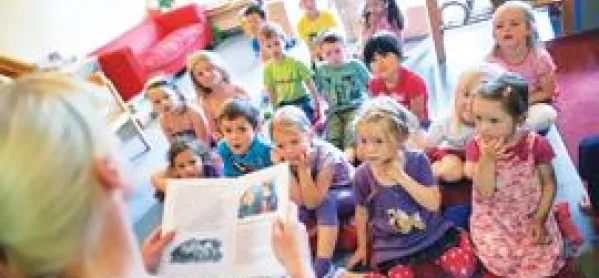High nursery numbers tell a cautionary tale

Early-years education is coming under severe pressure as teacher-pupil ratios decrease in half of local authority areas, a TESS survey suggests.
The findings have prompted serious concerns about the impact of budget cuts and the demands of a national policy that now entitles all three- and four-year-olds to 600 hours of free preschool education, up from 475 hours previously.
In responses from 22 councils, 11 show that the ratio of qualified teachers to pupils in early-years settings worsened between 2013-14 and 2014-15.
Inverclyde Council, for example, reduced the number of teachers from 17.5 full-time equivalent posts to eight, although the number of pupils rose from 679 to 693. This means that the number of children per qualified teacher has increased from 39 to 87.
In the Western Isles, the number of teachers fell from five to two despite the school roll increasing from 457 to 459, pushing the ratio from 91 children per teacher to 230.
The overall number of teachers in Scottish nursery schools has declined from 1,704 in 2006 to 1,212 in 2014, government figures show.
Pupil-teacher ratios have also been a hot topic in primary and secondary schools, with the EIS teaching union recently warning of a “stitch-up” between government ministers and local authorities to reduce overall teacher numbers in Scotland.
Authorities have previously committed to maintaining the ratio at about 13.5 pupils per teacher, but umbrella group Cosla suggested that this might no longer be tenable.
According to the Voice Scotland union, which represents preschool staff, schools have had to cut the amount of non-contact time for nursery staff in order to meet demands.
“This has been a matter of great concern to our organisation, with reduced time for activities such as self-evaluation, improvement planning, policy review and staff meetings,” said senior professional officer Jennifer Barnes.
“There had even been the suggestion during the consultation process within one local authority that nurseries may need to close in the event of a staff member being off sick,” she added.
Greg Dempster, of the Association of Headteachers and Deputes in Scotland, said the reduction in staff was a result of budget pressures but also a vague government commitment to provide “access” to a nursery teacher. The commitment had “never been properly defined or enforced, with the result that councils are free to interpret it in their own way”, he said.
Margaret Smith, a nursery teacher with more than 30 years’ experience who is now Falkirk secretary of the EIS, said the issue was about more than the number of teachers - it was about who those teachers were.
This was an “unsettling time”, she said, as many councils were removing full-time specialist nursery teachers and turning instead to part-time cover and teachers with little or no expertise in preschool education.
“You wouldn’t ask a physics teacher to teach maths - that’s how I’d sum it up,” Ms Smith said. Curriculum for Excellence ran from the ages of 3-18 so children should have teachers at every stage, she added. “Why would you leave a three- to five-year-old without a teacher at an influential stage when you’re putting the foundation of education in place?”
The EIS has long called for guaranteed access to a qualified teacher for all children in pre-5 settings. Last year, it lost its legal bid to prevent Glasgow City Council from filling senior roles in nurseries with non-teachers.
Speaking this week, EIS general secretary Larry Flanagan told TESS: “There has been a trend over the past few years for local authorities to reduce the number of teachers that work in nurseries, which makes the Scottish government commitment to ensure access to teachers more challenging.
“All the research evidence shows that the role of teachers in terms of pedagogy is crucial to maximising the benefit for children from the pre-5 service.”
A Scottish government spokeswoman said it had invested pound;4 million in developing the nursery workforce and supporting extra postgraduate places for primary teachers planning to specialise in early years. Extra places on childhood practice degrees had also been created, she said.
School statistics for 2014 showed that 85 per cent of children aged 3 and 4 had “access” to a General Teaching Council-registered teacher, she added, up from 83.5 per cent in 2013.
The Scottish government has also appointed early years expert Professor Iram Siraj to review workforce issues.
Against the clock
The headteacher of a primary school with 80 preschool children and one nursery teacher says morale has suffered badly since the 600 hours policy was introduced in August.
“Almost all children are taking up the full entitlement and it’s not just affecting teachers - often the biggest impact is on nursery nurses, as they’ve now only got a few minutes’ preparation time before each session,” the headteacher says.
Meanwhile, nursery teachers are increasingly performing a more managerial role because nursery nurses have little time for anything other than working directly with the children.
It is too early to assess the impact of the 600 hours policy on children, the headteacher says, but there are signs of the extra pressure on staff reducing the quality of nursery education. The decline in nursery teachers is at odds with Scottish policymakers’ vows to focus on early years education, the headteacher adds.
Keep reading for just £1 per month
You've reached your limit of free articles this month. Subscribe for £1 per month for three months and get:
- Unlimited access to all Tes magazine content
- Exclusive subscriber-only stories
- Award-winning email newsletters